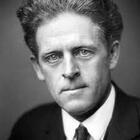
A writer, poet, amateur historian and ethnographer, Neihardt was born into a poor family. Although his parents conveyed an interest in reading and creativity, little John showed signs of being a precocious child. At the age of eleven, during an illness, he had a mystical experience that convinced him of his vocation as a poet. In 1897, at the age of sixteen, he graduated from the Nebraska Normal School, and immediately began writing poetry. In 1900, he published The Divine Enchantment and The Wind God's Wooing, works that were not very successful, but which are early indications of Neihardt's fascination with spirituality and with cultures other than European and American. During this time he lived with his mother in Nebraska, near an Omaha reservation, which probably gave him his first contact with Native Americans, communities for which he would feel a growing interest over the years and that would give rise to unforgettable texts such as Black Moose Speaks (1932).
Neihardt was Professor of Poetry at the University of Nebraska, Literary Editor in St. Louis, and Poet-in-Residence and Professor at the University of Missouri at Columbia. He was named Nebraska's first poet laureate and also the nation's first poet by the National Poetry Center in 1936.





